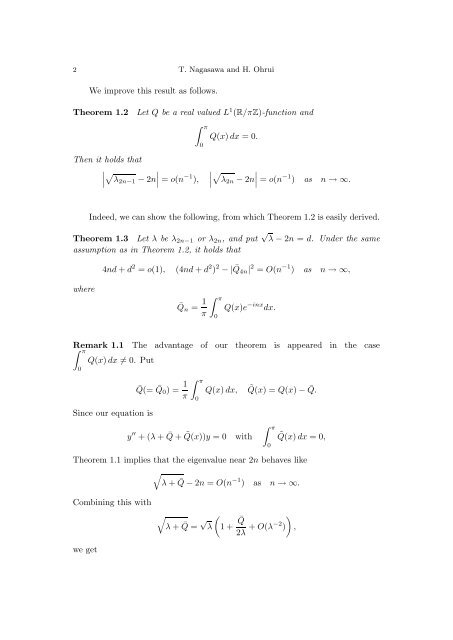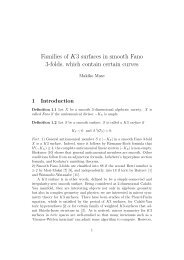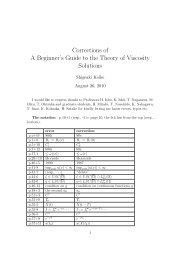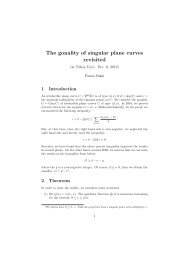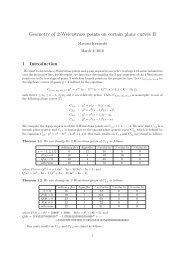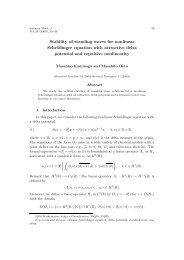2 T. Nagasawa and H. OhruiWe improve this result as follows.Theorem 1.2Let Q be a real valued L 1 (R/πZ)-function andThen it holds that∣ √ λ 2n−1 − 2n∣ = o(n −1 ),∫ π0Q(x) dx =0.∣ √ λ 2n − 2n∣ = o(n −1 ) as n →∞.Indeed, we can show the following, from which Theorem 1.2 is easily derived.Theorem 1.3 Let λ be λ 2n−1 or λ 2n ,andput √ λ − 2n = d. Under the sameassumption as in Theorem 1.2, it holds that4nd + d 2 = o(1), (4nd + d 2 ) 2 −|¯Q 4n | 2 = O(n −1 ) as n →∞,where¯Q n = 1 π∫ π0Q(x)e −inx dx.Remark ∫ 1.1 The advantage <strong>of</strong> our theorem is appeared in the caseπQ(x) dx ≠0. Put0Since our <strong>equation</strong> is¯Q(= ¯Q 0 )= 1 π∫ π0Q(x) dx,y ′′ +(λ + ¯Q + ˜Q(x))y =0<strong>with</strong>˜Q(x) =Q(x) − ¯Q.∫ π0˜Q(x) dx =0,Theorem 1.1 implies that the eigenvalue near 2n behaves like√λ + ¯Q − 2n = O(n −1 ) as n →∞.Combining this <strong>with</strong>√λ + ¯Q = √ (λ 1+ ¯Q )2λ + O(λ−2 ) ,we get
ASYMPTOTIC DISTRIBUTION OF EIGENVALUES OF HILL’S EQUATION 3√ ¯Qλ − 2n = −2 √ λ + O(n−1 ).√Both terms in the right hand side are O(n −1 ), and therefore we know onlyλ =2n + O(n −1 ). By using Theorem 1.2, we can determine the next termto 2n as√ ¯Qλ =2n −4n + o(n−1 ).Remark 1.2 Under higher regularity <strong>of</strong> Q, the more precise asymptotics havebeen already known. For example, see [6, Theorems 2.12 and 2.13]. The readerscan refer [4, 5, 7] and references cited therein for asymptotic formulae <strong>of</strong><strong>eigenvalues</strong> for Hill’s <strong>equation</strong> <strong>with</strong> discontinuous coefficient.2. On √ λ 2n−1 , √ λ 2n ∼ 2nIn this section we comment on the fact(2.1)√λ2n−1 =2n + o(1),√λ2n =2n + o(1) as n →∞.This was shown in [6] under the assumptionQ ∈ L ∞ (R/πZ),∫ π0Q(x) dx =0.Borg [2, pp.88ff.] had investigated the problem under Q ∈ L 2 (R/πZ). Here weassert thatTheorem 2.1The asymptotics (2.1) holds underQ ∈ L 1 (R/πZ),∫ π0Q(x) dx =0.Since Hill’s <strong>equation</strong> has very long history, we find about 600 papers onMathSciNet, some <strong>of</strong> them are not easy to access now. The authors could notstudy all <strong>of</strong> them, and are not sure whether the above theorem has been alreadyknown or not. Even if it is not new, they would like to give the pro<strong>of</strong> here forthe sake <strong>of</strong> completeness. Since it is almost parallel <strong>with</strong> that in [6], we mentiononly its outline.Pro<strong>of</strong>.Let y 1 (·,λ)andy 2 (·,λ) be solutions <strong>of</strong> (1.1) satisfying(2.2)y 1 (0,λ)=1,y ′ 1(0,λ)=0,


